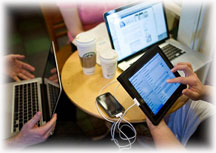While aware of the risks, U.S. travelers aren’t taking the necessary steps to protect themselves on public Wi-Fi, thus exposing both business and personal information to cybercriminals.
That’s the headline from a recent study analyzing travelers’ behavior and knowledge. It’s been estimated that 89% of Wi-Fi hotspots are not secure. The increased use of smartphones and tablets to access unsecured public hotspots has dramatically increased the risk of threats.
The study found travelers were three times more likely to use a smartphone or tablet than a laptop to access an unsecured hotspot in a shopping mall or tourist attraction, two times more likely in a restaurant or coffee shop, and 50% more likely at the airport.
Troubling Findings
Experts called it “troubling” that while most travelers are concerned about online hacking, very few know how, or care enough, to protect themselves. Threats from cyber-thieves to malware and snoopers are skyrocketing on public Wi-Fi, and travelers need to be vigilant in protecting themselves.
A striking 82% of travelers said they suspect their personal information is not safe while browsing on public Wi-Fi, yet 84% don’t take the necessary precautions to protect themselves.
The top three concerns cited were the possibility of having personal information stolen when:
Engaging in banking or financial sites (51%).
Making online purchases that require a credit or debit card (51%).
Making purchases using an account that has payment information stored (45%)
Researchers say consumers underestimate their exposure to risks when connecting to public Wi-Fi. For example, many fail to understand that having their email logon information compromised could allow hackers to access many of their online accounts.
